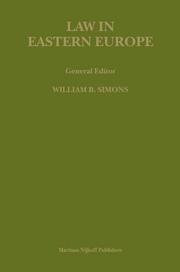| Listing 1 - 1 of 1 |
Sort by
|

ISBN: 9041118365 9786610468126 1417555211 1280468122 9047403134 9781417555215 9789047403135 9781280468124 6610468125 9789041118363 Year: 2002 Volume: 50 Publisher: The Hague Nijhoff
Abstract | Keywords | Export | Availability | Bookmark
 Loading...
Loading...Choose an application
- Reference Manager
- EndNote
- RefWorks (Direct export to RefWorks)
The last decade of the 20th century saw radical changes in Eastern Europe and the former USSR. Most of these countries made a transition from totalitarianism or authoritarianism to democracy and from central planning to a market economy. Adding to the latter, a number of national entities gained their independence after the disintegration of the federative states of the USSR, Yugoslavia and Czechoslovakia. Many recent studies have focused on these double, in some cases triple transitions, and scholars from different fields analyzed the so-called "1989 Revolution" from different perspectives. Rather less scholarly attention has been paid to the future of post-communist constitutions and prospects for constitutionalism in these countries. The main questions dealt with throughout this study can be formulated as follows: Will liberal democratic constitutionalism take root in these countries? Will new constitutions in Eastern Europe and the former USSR perish or survive? This study also aims at contributing to the construction of a general constitutional theory by studying the causes and dynamics of constitutional change in general. Such constitutional change is not only on the East European, but also on the West European agenda. The purpose of this study is not to introduce a general theory about constitutional in/stability, but studying post-communist constitutions will help us to understand the causes and dynamics of constitutional change from a broader perspective.
Democracy --- Democratie --- Démocratie --- Inspraak in het beleid --- Overlegcultuur --- Self-government --- 342.4.02 <4-11> --- Constitutional law --- -Democracy --- Post-communism --- -342.4.02 <4-11> --- Postcommunism --- Constitutional limitations --- Constitutionalism --- Constitutions --- Limitations, Constitutional --- 342.4.02 <4-11> Grondwettelijkheid--Oost-Europa --- Grondwettelijkheid--Oost-Europa --- Interpretation and construction --- Droit constitutionnel --- Postcommunisme --- Démocratie --- Political science --- Equality --- Representative government and representation --- Republics --- Public law --- Administrative law --- Europe [Eastern ] --- Former Soviet republics --- Democracy. --- Former Soviet republics.
| Listing 1 - 1 of 1 |
Sort by
|

 Search
Search Feedback
Feedback About UniCat
About UniCat  Help
Help News
News